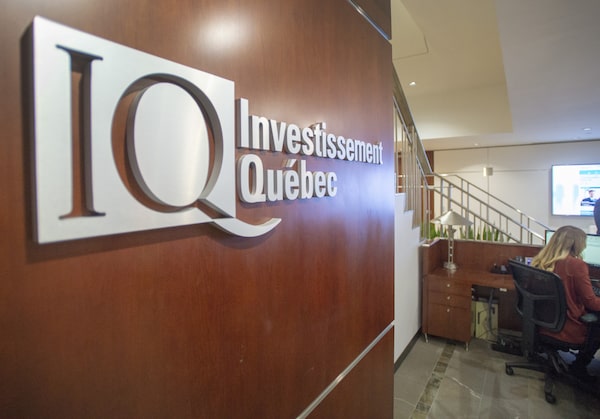
A joint investment into Montreal startup Element AI would see the provincially owned Investissement Québec agency put in US$25-million, while the Caisse de dépôt et placement du Québec would contribute US$75-million.Ryan Remiorz/The Canadian Press
The Quebec government and pension-fund giant Caisse de dépôt et placement du Québec will invest a combined US$100-million in Element AI Inc., representing up to half of a coming venture-capital financing by the Montreal artificial-intelligence startup, Quebec’s Economy and Innovation Minister Pierre Fitzgibbon said.
The cabinet of Premier François Legault last month issued an order-in-council that the government would invest US$25-million through Investissement Québec (IQ), a provincially controlled investing agency, as Element “is of significant economic interest to Quebec.” IQ portfolio managers typically make their own investing decisions that are approved internally, but, in some cases, cabinet taps a politically directed fund, investing it through IQ, Mr. Fitzgibbon told The Globe and Mail in an interview.
The minister also said the Caisse would put up US$75-million, gaining the right to appoint a director to the board. He said the government would receive a stake of between 4 per cent and 5 per cent in Element AI, translating into a company valuation of up to US$625-million based on the figures provided.
However, a Caisse source disputed that its investment is a done deal, in a rare example of public disagreement between the investment manager and the government that controls it.
The Caisse is mandated by the province to both support Quebec’s economic development and generate returns for depositors. Mr. Fitzgibbon said the Caisse, with $327-billion in assets under management, “made its own assessment regarding the investment" after working jointly with the government on due diligence.
But Caisse spokesman Maxime Chagnon said: “It’s far from clear that we’re about to make an investment in that company or not. You would be wrong and taking a big risk to jump to any conclusion [based on] whatever you’ve been told and by whoever you’ve been told.”
He added: “Whether we do it or not has nothing to do with government. We make our own investment decisions based on our criteria and process.”
Mr. Fitzgibbon asserted that with the Caisse and Investissment Québec potentially accounting for half of the financing, “obviously we have our stake in the ground and we through the Caisse will be influencing the mission, influencing strategy [though] not directing it.” The Globe reported last month the Caisse and the province would participate in the financing, citing unnamed sources.
In a statement to The Globe, Element AI acknowledged it was “in advanced discussions with investors as we work to complete our round of financing,” but said it had “no updates or projected timelines for any announcement." The company said “we welcome the trust the government of Quebec has placed in Element AI,” but did not comment on the Caisse’s involvement. A venture-capital financing of US$200-million would rank as one of the largest in Canadian history.
The Caisse has emerged as one of the most active venture-capital investors in Canada in recent years, backing such companies as Lightspeed POS and Hopper and Breather Products.
Element AI became one of the world’s most watched AI startups upon its founding three years ago because of its association with co-founder Yoshua Bengio, a University of Montreal professor regarded as one of the godfathers of deep learning, the foundational science of today’s AI revolution. Buoyed by a US$102-million venture financing in 2017 backed by Canadian and global investors including Microsoft Corp., Tencent Holdings Ltd. and Fidelity Investments Canada, Element AI went on a hiring spree, surpassing 500 employees and becoming so big it no longer qualified as a small business, limiting its access to tax credits.
But Element has had setbacks getting products to market while bearing heavy operating costs, The Globe reported in July. Other domestic AI startups have complained Element is draining the market of talent and has yet to prove its commercial viability.
Nevertheless, Element has positioned itself as the champion of a homegrown AI sector that the government and the Caisse have been keen to promote as a driver of economic activity. The current Coalition Avenir Québec government and the previous Liberal one have committed hundreds of millions of dollars to initiatives since 2017 to bolster Montreal’s standing as a global AI centre, while the Caisse in March launched a $250-million fund to invest in Quebec AI companies.
Mr. Fitzgibbon said he was aware of the issues raised in The Globe article, but said Element has undertaken “a lot of soul searching” in recent months. “There is some adjustment required [and] we’ll be tightly monitoring them,” he said, adding that the company needed to focus its efforts on promising applications, adding large customers and working in a “proper partnership with the shareholders … to bring outside resources to influence the strategy.
"They need to be generating a lot of revenue and profits, which they aren’t right now. … Although it is a risky investment, it is one we as a government [believe] is worth it.
 Sean Silcoff
Sean Silcoff